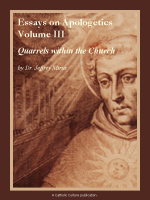Bishop Fellay: 'total acceptance of Vatican II' no longer prerequisite for full communion with Holy See
CWN - June 08, 2012
Stating that discussions with the Holy See "have allowed us to present clearly the various problems that we experience with regard to Vatican II," the superior general of the Society of St. Pius X said in an interview that "what has changed is the fact that Rome no longer makes total acceptance of Vatican II a prerequisite for the canonical solution."
"The attitude of the official Church is what changed; we did not," said Bishop Bernard Fellay. "We were not the ones who asked for an agreement; the Pope is the one who wants to recognize us. You may ask: why this change? We are still not in agreement doctrinally, and yet the pope wants to recognize us! Why? The answer is right in front of us: there are terribly important problems in the Church today."
Asked about religious liberty, ecumenism, and other doctrinal issues that have been points of disagreement between the Holy See and the Society, Bishop Fellay said that
If we want to make the treasure of Tradition fruitful for the good of souls, we must speak and act. We need this twofold freedom of speech and action. But I would mistrust a purely verbal denunciation of doctrinal errors—a denunciation that would be all the more polemical because it was only verbal. With his characteristic realism, Archbishop Lefebvre recognized that the Roman and diocesan authorities would be more responsive to numbers and facts presented by the Society of Saint Pius X than to theological arguments …
One of the great dangers is to end up inventing an idea of the Church that appears ideal, but is in fact not found in the real history of the Church. Some claim that in order to work "safely" in the Church, she must first be cleansed of all error. This is what they say when they declare that Rome must convert before any agreement, or that its errors must first be suppressed so that we can work. But that is not the reality. It is enough to look at the Church's past: often, and almost always, we see that there are widespread errors in the Church. Now the reforming saints did not leave the Church in order to combat these errors.
"In this situation, which some currently depict as an impossible situation, we are being asked to come and work just as all the reforming saints of all times did," he added. "Certainly that does not do away with the danger. But if we have sufficient freedom to act, to live and to grow, this must be done. I really think that this must be done, on the condition that we have sufficient protection."
Additional sources for this story
Some links will take you to other sites, in a new window.

